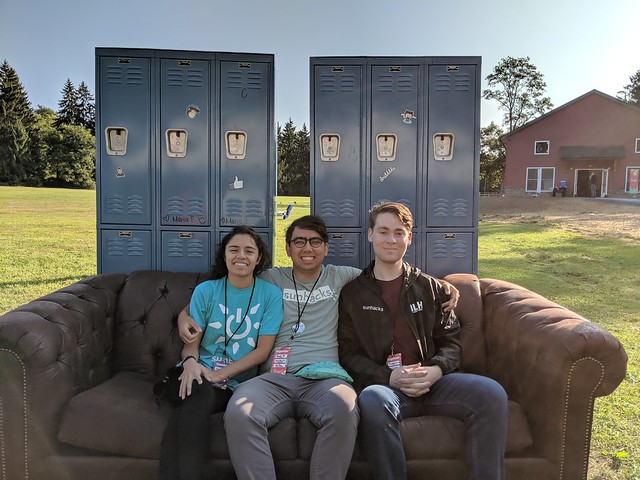Students host 3-day Sunhacks hackathon
Sunhacks has been described as a collaborative coding marathon and as an addictive experience in innovation and design.
The annual three-day hackathon, run by ASU students through Major League Hacking, is a unique professional development and social opportunity. During the event, participants spent most of their waking hours working together on coding projects Sept. 20–22 at the Sun Devil Fitness Complex at ASU’s Tempe campus.
The Sunhacks student organization is committed to growing the local tech community in Arizona and was launched by ASU students to bring people of all backgrounds together to develop skills to learn, build and code.
During his second year at ASU, explorations system design graduate student Paul Horton, 22, attended the University of Arizona’s hackathon, Hack Arizona. After enjoying his experience, he and some friends decided to create a hackathon for ASU.

From left: Sunhacks members Cecilia La Place, 23; Paul Horton, 22; and Thaddeus Martin, 19
“I was blown away at how enjoyable it was, and I wanted to make something like that happen here, too,” Horton said.
Engineering education systems and design graduate student Cecilia Laplace, 23, was also at Hack Arizona when Horton attended. She later assisted Horton in organizing the first Sunhacks event.
“I wanted other people to experience the same joy I did,” Laplace said.
The unique and engrossing experience begins on a Friday night at 5 p.m. and runs through Sunday at noon. Participants are instructed to bring a laptop and charger, anything else they want to use to hack and whatever they need to eat, sleep and code for three days. Sleeping areas and showers are provided.
For second-year computer science major Thaddeus Martin, 19, Sunhacks was a place to discover his abilities.
“What I was really looking for was a safe place to do practical work and explore technologies and projects that I would be interested in,” Martin said. Everything led him to Sunhacks.
The third annual hackathon was open to ASU students and anyone over the age of 18. All levels of experience were welcome and encouraged to sign up. It was a weekend full of fun, competitive programming and coding.
The event featured "free food, free swag and free networking,” Horton said.
The last day was “demo day,” where teams will show off what they created to the public. It is the time to be proud of the work that was done, even if what was created did not turn out to be successful.
“I want to encourage failure as a way of learning. It is one of the best ways to learn,” Laplace said.
The organization is hoping to grow their presence and have more events throughout the year in the future.
Visit the Sunhacks website for more information on the event and future coding activies.